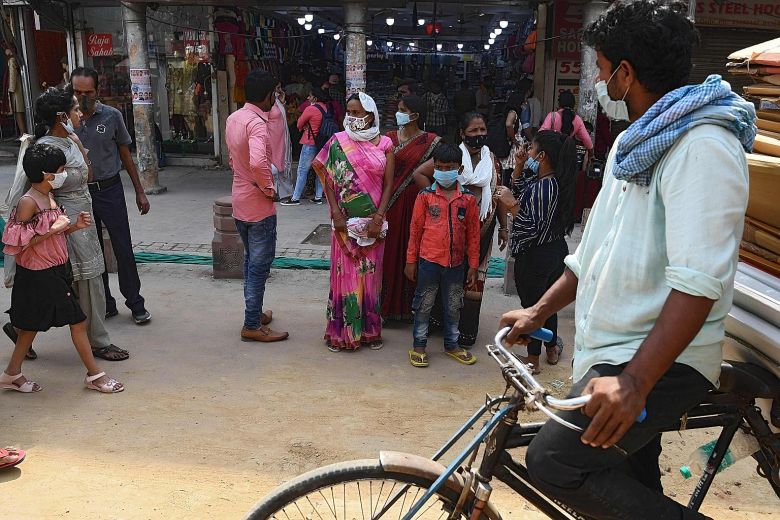
Shoppers in masks at a market area in New Delhi’s old quarter yesterday. Health experts fear air pollution could increase the risk for patients who have ailments such as chronic bronchitis and other respiratory diseases. PHOTO: AGENCE FRANCE-PRESSE
NEW DELHI — As New Delhi’s air quality starts to deteriorate in what has become an annual occurrence in the run-up to winter, concerns are growing over how the coming pollution could potentially complicate the Covid-19 situation.
India’s capital has been among the worst affected cities in the country by the coronavirus pandemic, with more than 300,000 people infected and a death toll of 5,740.
Last Saturday, the city recorded 2,866 fresh cases, as it battled a second wave.
Health experts fear air pollution could increase the risk for patients who have ailments such as chronic bronchitis and other respiratory diseases.
“We might see a spike. Right now the trend is slightly going down but we don’t know how air pollution will contribute to an increase,” said Dr Chandrakant Lahariya, an expert on public health, policies and strategies, adding that air pollution exacerbates the condition of people who have respiratory or pulmonary disease.
He warned: “There are studies in which air pollution is linked to increased mortality, but such evidence is limited.”
Studies have also pointed to increased Covid-19 infection rates in areas that suffer from high pollution.
A study by the Harvard T.H. Chan School of Public Health in the United States in May found that someone who lived in an area of high-particulate pollution for decades was 8 per cent more likely to die from Covid-19 than someone in a place with less pollution.
An Italian study by environmental scientists at Aarhus University and health researchers at the University of Siena found that the mortality rate from Covid-19 came up to 12 per cent in the northern part of Italy, while it was around 4.5 per cent in the rest of the country.
The researchers concluded there was a probable correlation between pollution and mortality.
In India, cold air traps pollutants in the atmosphere during the winter months, which are also when farmers burn the stubble in their fields to prepare for the next set of crops.
All this adds to existing pollution from vehicles, construction activity, burning of waste and use of unclean fuels.
A report by the US Health Effects Institute said that around 1.2 million people died in India in 2017 because of air pollution.
According to weather forecasters, pollution levels have already started climbing and will get worse from the middle of this month.
Air quality had improved following a stringent lockdown, now eased, that shut down economic activity.
Delhi’s air quality turned “poor” between last Wednesday and yesterday, for the first time since June.
According to Safar (System of Air Quality and Weather Forecasting And Research), under the Ministry of Earth Sciences, the situation could improve in the coming week due to favourable winds.
Delhi chief minister Arvind Kejriwal last Monday announced a campaign against pollution, with plans to control dust by filling up potholes and closely monitoring construction sites, among other measures.
A report from the National Centre for Disease Control has warned that Delhi could hit 15,000 new cases a day due to respiratory problems related to winter and festive gatherings, with the festive season kicking off this month, according to Indian media reports.
Referring to solutions, environmentalists say the problem, as in previous years, has been implementation and enforcement.